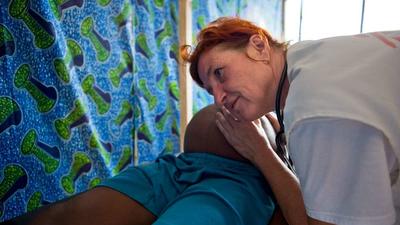Spectacular results are in for a malaria prevention campaign led by Médecins Sans Frontières/Doctors without Borders (MSF) in Chad. While responding to a rise in malaria in the country, MSF has seen 70 percent fewer cases after distributing a preventive treatment for the disease. It is a real sign of hope in the fight against malaria, which is the main killer of children-under-five in Chad.
Since July 2013, more than 40,000 new malaria cases have been treated by MSF in Am Timan in the southeast, and in Massakory in the west.
Lethal combination
”In Massakory hospital, we admit between 20 and 40 malaria patients each day,” says Letizia Becca, MSF medical coordinator in Chad.
“In addition to a great increase in cases, their severity is indeed worrying, for adults and teenagers – something I had never seen before – as well as for children who remain the hardest hit”.
When combined with another disease, such as acute malnutrition, malaria can be lethal.
“My son is six-months-old. When MSF nurses came to our village, they told me that if my son gets a fever, it can be because of mosquito bites.
“So when my child fell sick, I brought him to the health centre and they directed me here,” said Florence in MSF’s Moissala malaria unit. “Now my son is better and I’m relieved”.
Anti-malarial medicine
In addition to treating patients, MSF has deployed considerable means to respond to the crisis: supplying health centres with medicines and rapid diagnostic tests, mobile clinics to reach remote areas and sensitisation campaigns aired on community radios.
If these operations respond efficiently to the current emergency, the seasonal malaria chemoprophylaxis (SMC) will demonstrate that malaria is preventable.
SMC is an oral anti-malarial medicine given to children under-five at times of high risk. Fifty thousand children received it this year in southern Chad.
“SMC reduces the number and the severity of malaria episodes for children and prevents them sinking into a critical and potentially lethal state,” explains Alain Camp, MSF head of mission in Chad.
“A 70 percent fall of malaria cases in less than a week after the distribution of the treatment is spectacular and very encouraging.”
This is all the more encouraging as the national programme against malaria itself has implemented this strategy in four districts this year.
It is essential that the Chadian authorities press to extend the programme to the rest of the country.
MSF calls on all international donors to support the Chadian Ministry of Health and its partners by making SMC a priority for their funding to fight malaria in Chad in 2014.
MSF in Chad
MSF has worked in Chad for more than 30 years and currently has programmes in Abéché, Am Timan, Massakory and Moissala. As well as Chad, MSF uses the seasonal malaria chemoprophylaxis in Mali and Niger.
Find out more about MSF’s work in Chad




